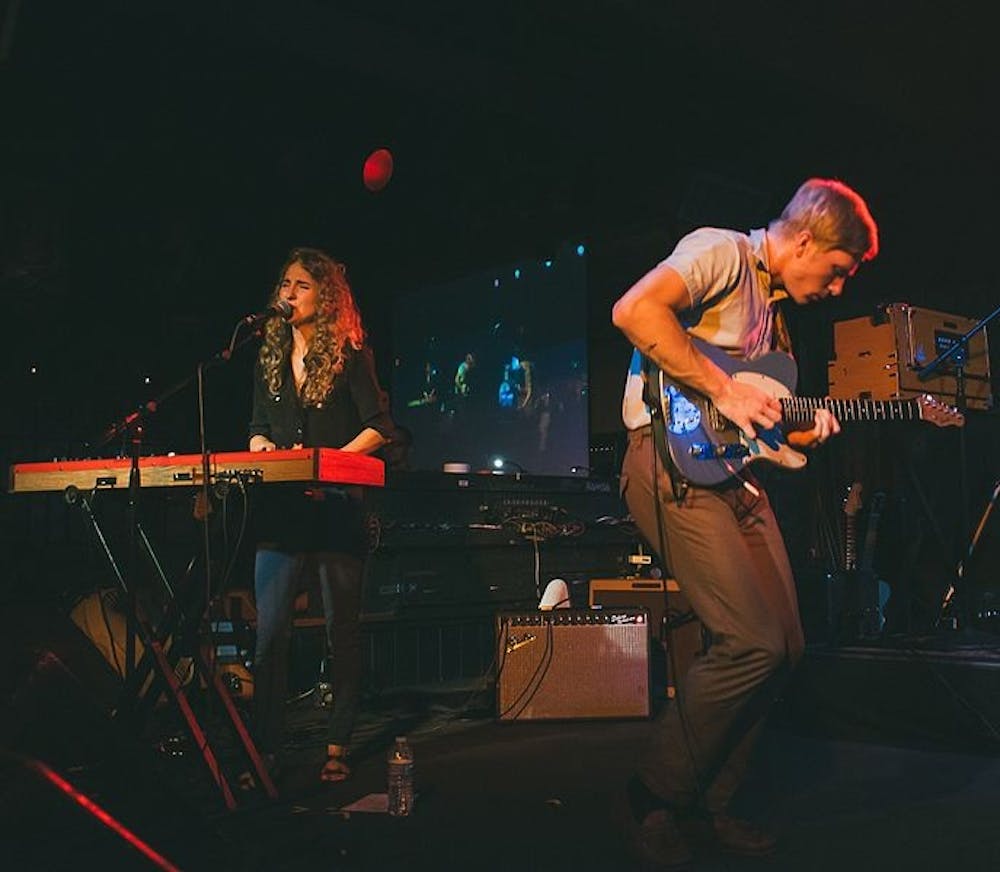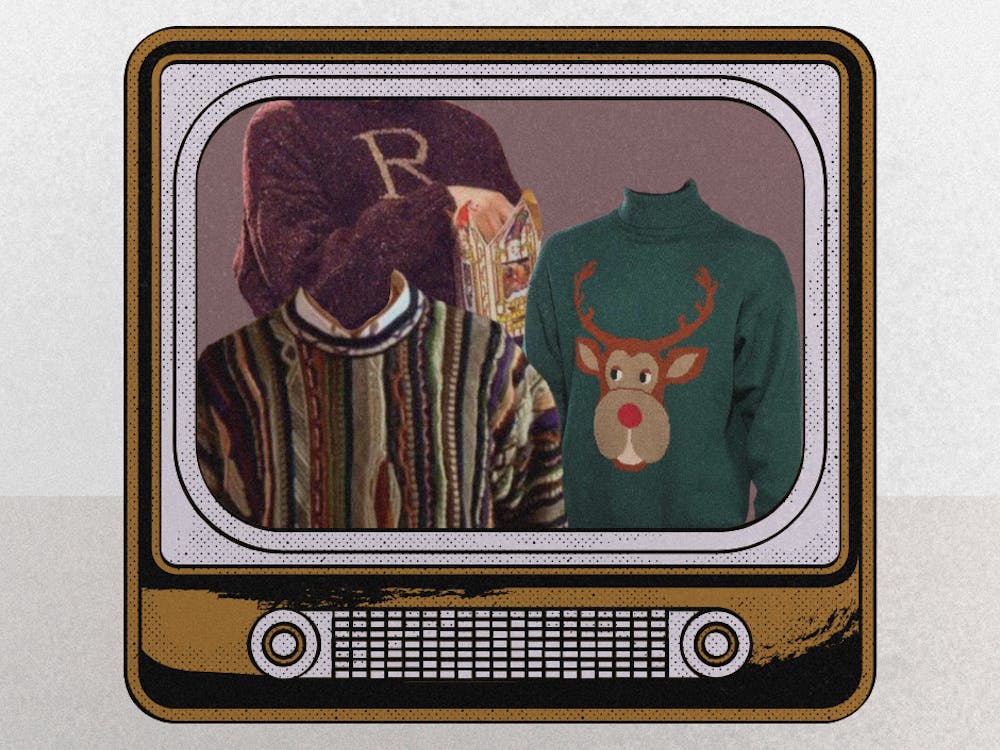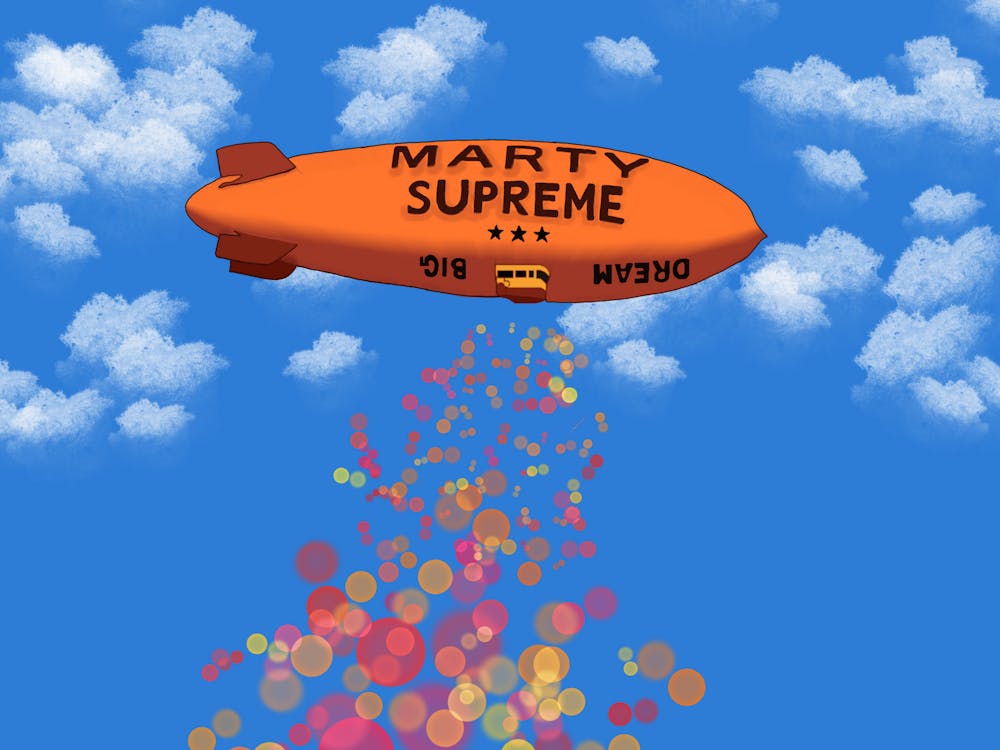In a paradoxical age where progressive ideals are paired with an obsession for vintage style, is it any wonder that a band like Tennis is thriving? Husband-and-wife-duo Patrick Riley and Alaina Moore have created a successful formula of glimmering indie pop, 20th-century-inspired outfits and lyrics addressing concepts of love and womanhood.
Last week, The Cavalier Daily got an opportunity to speak to one half of this powerhouse over the phone in the form of a pleasant, composed Alaina Moore. She shared the inspiration for this year’s album “Yours Conditionally” and discussed the band’s unusual creative processes, along with her personal influences in both musical and aesthetic styles.
The interview has been lightly edited for length and clarity.
Arts and Entertainment: So “Yours Conditionally” was developed while you and your husband were sailing the Sea of Cortez, right?
Alaina Moore: That’s right.
AE: You’ve mentioned in past interviews how terrifying you and Riley find the ocean. What makes it such a useful setting for inspiration?
AM: Well, it’s incredibly rewarding. To speak more specifically to the terrifying part of sailing, one thing that we noticed is that the very real pragmatic fears of dying at sea eclipsed our fears of being bad writers or any sort of ego-based concerns about our band, the quality of our work or anything. It put a lot of things into perspective.
But I’m not advocating putting yourself into life-threatening situations in order to write better … I feel like it has its own appeal and rewards distinct from anything else. I just happened to notice that it made writing a lot easier. My head was focused and I didn’t feel self-critical when I was on the boat, because my concerns were much more real and visceral — what the weather would be like, if we would find safe anchorage, that sort of thing. It was just more concrete and I felt more grounded. Writing was just simpler in that setting.
AE: Between the two of you — you and your husband — who would you say is more responsible for the songwriting?
AM: Actually, it’s a completely equal workload. We kind of write separately. For “Yours Conditionally,” I wrote half the songs and he wrote half the songs. We usually get each song to about 60% complete, and then we show each other our work and kind of act as producer to what the other person has made. So Patrick will help me trim my song. He’ll help choose sounds and arrangements and he’ll often write a drum beat to it or whatever. And then vice versa — he’ll write a series of chords and I’ll help cobble it together, write melodies for it, that sort of thing.
So it’s a tag-team effort, but you can tell who started each song because we have very distinct styles. Mine is more ballad … anything up-tempo, Patrick wrote. Anything down-tempo, I wrote, basically.
AE: It sounds like you guys have a really good balance.
AM: Yeah, we do … we actually have pretty disparate tastes, but what little overlap we have is kind of where it gets to exist. In going through each others’ filters, I’ll write something that’s very different from whatever he would have dreamed up on his own, but by the time he’s gotten his hands on it and he’s played guitar, written a drum beat, or whatever, it feels like a song by that point. And then when he writes a bunch of guitar parts, by the time I sing over it, it’s become a Tennis song. That’s what allows us to indulge our own separate interests with writing and allow it to come together in the end.
AE: In the most recent album, I noticed an increase in lyrics that discuss what it is to be a woman — how women are perceived today. Has this become a more prevalent topic for you to address in your music?
AM: Basically, ever since we wrote “Cape Dory,” which was the easiest, most natural record ever to write, especially lyrically, since it just literally describes the first sailing trip we ever went on. It was really good practice for songwriting — I had never written songs before. Ever since then, I’ve not wanted to do that kind of record ever again. Since then, I’ve really been trying to find my voice — my narrative voice as a lyricist … I’ve always been drawn to songwriting for its melodies, not for my ability to have a point of view … I hate poetry. I feel weird saying that, but I just really don’t care — and I’m almost ambivalent to song lyrics. I’ll notice them if they’re bad, but in general I just prefer ignoring the lyrics that don’t distract me from songs.
This has just been a long progression for me of trying to figure out how I can connect with the lyrics, how I feel like I can have a point of view and something to say that’s true to me, but that doesn’t distract from my songwriting. I just happen to be at a time in my life where I’m thinking about womanhood and I don’t feel like a child anymore.
When we first started Tennis I was in my early 20s and now I’m in my early 30s. I’m just in a different place in life so I’m naturally thinking about those things. If I have to sing a song night after night onstage, I really want to care about what I’m saying. So I’ve been thinking about womanhood and marriage, and things that I’ve been told to want or that are foundational to being a human being … I’ve been spent a lot of time trying to unpack that and decide how much of that means something to me personally and how much of it doesn’t. So that’s what I’ve been spending my time writing about.
AE: Almost as striking as your musical style is the aesthetic style of you and your husband. What would you say are some of the inspirations of that?
AM: A lot of it’s just naturally our taste. I’ve always been interested in vintage clothing and vintage sounds … even our sailboat itself is incredibly nostalgic — it runs off electricity from a small battery so we use a kerosene lantern and we’re powered by the wind … we had a foot-pump water heating system so everything was mechanical and old-school. It just felt like an ancient way of life. I’ve always been interested in that sort of juxtaposition. I’m not a Luddite or anything — when I come home, I just stare at my computer like everyone else and search the Internet. But I just like to have these bursts of these other ways of living and I’m just aesthetically drawn to things that feel timeless.
I don’t really feel connected to any era specifically — I like something from everything. I notice people always saying that our most recent visuals are “so 70s,” which is funny to me because I’m not specifically looking at anything from the 70s. I draw from the Victorian era, to the 80s, to the 90s, to whatever … I don’t know. People just see what they want to see. What I’m hoping for is something that just feels timeless, where you don’t really know when it was made.
AE: Earlier this summer, I got to see you open for the Shins. What has it been like touring with classic indie rock bands like them, and how does it differ from being the main act on stage?
AM: I love being the opening band because the success of the evening is not riding on my shoulders. But playing our own shows is really nice, because usually everyone is there to see us and they know who we are, they know our songs … that makes playing really fun. But the Shins’ crowd is extremely warm and welcoming. We haven’t had a single bad show with them.
Every once in awhile, you run the risk of being the opening band where people have no idea who you are and you just don’t connect and they just stare blankly or talk over you. We’ve been super fortunate to not have that experience at all. We toured with Spoon and then joined up with the Shins, and it’s just been extremely rewarding. I always feel like I’m learning something when I watch a more seasoned band on tour … you learn a little bit about what makes a good show. Our experiences have just been playing house shows or basements or garages. We’ve been playing for a long time now, but it’s really nice to learn from someone who’s farther along in their career.
Tennis will play at the Southern Café and Music Hall on Aug. 5.







